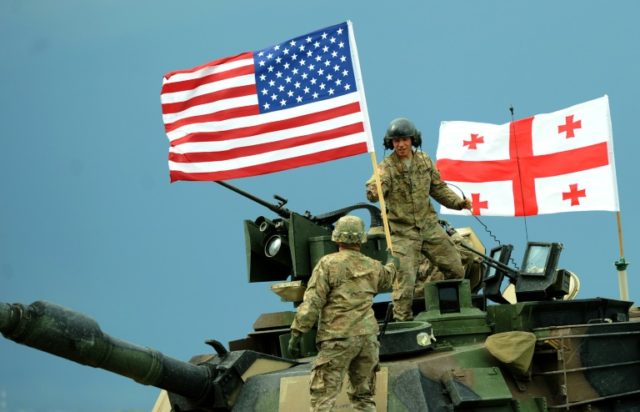Tbilisi (AFP) – The United States and Georgia signed a security deal Wednesday designed to shore up the former Soviet republic’s defences against Russia as it waits to join NATO.
US Secretary of State John Kerry and Georgian Prime Minister Giorgi Kvirikashvili inked the agreement at a ceremony in Tbilisi just two days before the annual NATO summit in Warsaw.
The agreement is bitter-sweet compensation for tiny Georgia, which was promised a path to NATO membership in 2008 but still has no real prospect of joining the alliance.
Two breakaway regions of Georgia are occupied by Russian forces and, along with Ukraine, it has seen its way to the alliance delayed by nervous European powers.
“On security, our partnership is unwavering,” Kerry told reporters, hailing Georgia’s large commitment of troops to the NATO support mission in Afghanistan.
“The Georgian people have chosen a Euro-Atlantic future and the United States remains committed to helping the Georgian people attain that goal.”
Tbilisi fought a brief war against Moscow in 2008. Russian troops now occupy the breakaway Georgian regions of Abkhazia and South Ossetia.
Kerry said the other NATO allies would this week repeat their promise, made in Bucharest in 2008, that Georgia will eventually join the transatlantic alliance.
The US pledge will infuriate Moscow and make some Western allies nervous that they may be called to defend Georgia against Russia or even try to force its troops out.
But Kerry told his hosts: “The United States remains steadfast in its support of Georgia’s sovereignty and territorial integrity.
“Russia’s occupation and militarisation of parts of Georgia’s territory are unacceptable.”
The vulnerable Caucasus country has already received US military assistance but so far this has been focused on helping it deploy troops on missions overseas.
The new memorandum would expand Georgia’s defence strength “and security cooperation in the areas of defence capacity building, military and security cooperation”.
Fears of Russian expansionism have risen over Moscow’s annexation of Crimea in 2014 and its support for separatist rebels waging an insurgency in eastern Ukraine.
– ‘Deeper partnership’ –
Constantly alert to what it sees as post-Cold War Western efforts to surround and pressure Russia, the Kremlin firmly opposes NATO expansion on its borders.
Georgia’s President Giorgi Margvelashvili and Ukraine’s Petro Poroshenko will attend the Warsaw summit, but as partners not as full members.
Washington is keen not to cede any more ground to President Vladimir Putin’s Russia, and Kerry’s visit to Kiev and Tbilisi is meant to show that.
Asked how the Kremlin might see such a trip ahead of the NATO summit, a senior US official smiled and said: “Russia can take whatever message it likes from this.”
Kvirikashvili lauded the new agreement with Washington as “an extremely important document”.
“The memorandum creates new framework for deeper partnership … for strengthening Georgia’s security and self-defence capabilities.”
Since 2008, Russian troops have tightened their grip over the breakaway Georgian regions, putting them 20 minutes drive from Tbilisi.
But under the NATO treaty, members have an obligation of mutual defence and few Western capitals want a direct standoff with a nuclear-armed Russia.
“NATO’s activities don’t strengthen the security of its members, but on the contrary provoke tensions,” Kremlin spokesman Dmitry Peskov warned on Tuesday.
“NATO’s expansionist policy underlines the aggressive character of the organisation.”
– Distant dream –
With full NATO membership a distant dream and EU expansion plans in chaos after Britain’s vote to leave the bloc, Georgia and Ukraine must focus on domestic reform.
Kerry also used his visit to Tbilisi to check on preparations for Georgia’s parliamentary elections in October.
Georgia is rare among former Soviet states in having organised successful democratic changeovers in power since leaving Moscow’s orbit — but this year will be a test.
The poll pits the premier’s Georgian Dream party, backed by billionaire tycoon Bidzina Ivanishvili, against former president Mikheil Saakashvili’s United National Movement.
Ukraine, meanwhile, is struggling to implement reforms promised under the Minsk Accord designed to halt the war in the east.
US officials will urge Kiev to complete its side of the deal and vow to maintain pressure on the Kremlin to reciprocate.
The EU last week renewed sanctions imposed on Russia for its role in destabilising Ukraine, but only for another six months.
US sanctions remain, but officials fear Putin will seek to retain his military leverage in Ukraine while waiting for US President Barack Obama to leave office in January.

COMMENTS
Please let us know if you're having issues with commenting.